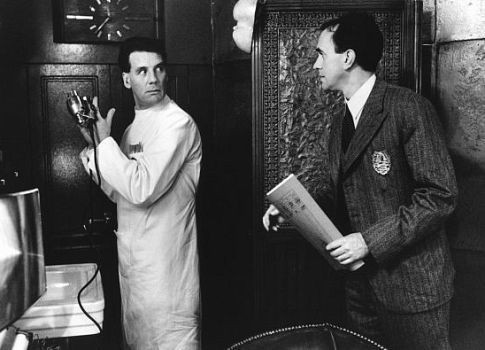MP MP
I just finished reading Michael Palin: Halfway To Hollywood, Diaries 1980 - 1988. Being a Python fanatic, I couldn't resist, though I'm not sure how interesting this sort of thing would be for non-fans. I guess there are enough of us, though, since this is a sequel to the previous decade's diaries.
That's the problem, of course. I like Palin (he is the most likable of the troupe), but the minutiae of his life hold only so much interest for me. These are selections from his diaries, but even so, reading his thoughts on his family, or world events, or trips he's making, aren't why I read this volume. I want to know the behind-the-scenes stories about the making of Monty Python (and related) projects. So the years '69 to '79 are the of the greatest interest. That's when the troupe created and performed their TV show, made Holy Grail and Life Of Brian, and did their best books and albums. It's also a chance to see the birth of a phenomenon--something none of them could have predicted. (They also did some interesting side projects in the 70s. Palin did Ripping Yarns, and, above all, John Cleese did Fawlty Towers.)
Not that Palin slacked off in the 80s. He did a show on great railway journeys, the first of his many travel specials, and later his own real-life verison of Around The World In 80 Days. He wrote and acted in Terry Gilliam's Time Bandits, which was a sizable hit. He was memorable in A Fish Called Wanda, an even bigger hit. He wrote and starred in the minor but enjoyable film The Missionary and starred in another minor but enjoyable film A Private Function. He also did good work in the highly regarded Terry Gilliam film Brazil. And as far as Monty Python, they recorded their Contractual Obligation album, performed at the Hollywood Bowl and turned it into a movie, and did their last original film The Meaning Of Life.
But for all that, it's not the same thing. Palin, and especially Monty Python, have become institutions. The sense of discovery is gone, and as far as the troupe's work, their best days are behind them.
But it's still fun to see how they operated. They were six highly opinionated individuals, and even when they agreed on things, it was often to turn easy money down when something didn't meet their standards. It's a strategy that, generally speaking, paid off, artistically at first, but, I'd guess, monetarily in the long run. Palin has British understatement, but a quiet pride in what he's doing sometimes peeks through.
I think Palin puts it well on page 39:
This lunch and the discussions were all part of the painful process of preserving Python. We don't fit into any easy patterns, we ask each other to make enormous compromises, ajdustments and U-turns, but we do produce the best comedy in the country.



1 Comments:
Sheesh another Palin post.
Post a Comment
<< Home